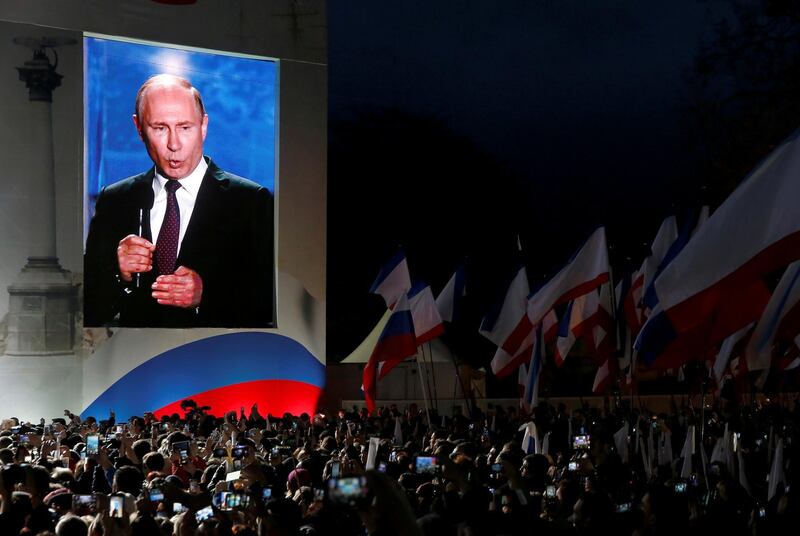In Crimea, which votes on Sunday in the Russian presidential election for the first time since its annexation from Ukraine in 2014, loudspeakers blast out the message: "Choose a president! Choose a future!".
Local authorities say the polls are a chance to thank President Vladimir Putin for taking control of the peninsula, but activists have complained of a crackdown ahead of what Kiev maintains is an illegal vote.
Crimea has suffered under western sanctions since the hastily organised referendum to rejoin Russia four years ago, but the Kremlin is making efforts to ease the area's isolation.
"We see the election as a second referendum and as an opportunity to thank Putin for what he did in 2014," said Alexander Formanchuk, an adviser to Sergei Aksyonov, the Moscow-installed Crimean leader.
With Mr Putin expected to return to the Kremlin for a fourth term on Sunday with a landslide vote, authorities across Russia have led a campaign to convince people to turn out at the ballot box.
__________
Read more
[ Putin set for re-election in Russia on Sunday ]
[ Russia retaliates by expelling 23 British diplomats ]
__________
On the Black Sea peninsula, the campaign is even more intense, with election posters covering public transport as well as loudspeakers blaring in public areas.
Mr Formanchuk - who calls the result "absolutely predictable" - said he is convinced most Crimeans will take part, saying the peninsula has a history of high voter turnouts.
He cited the 2010 Ukrainian presidential election when Crimea overwhelmingly supported pro-Kremlin Viktor Yanukovych, now living in exile in Russia, as an example.
Vladislav Ganzhara, who was seven years old and a Ukrainian citizen when Mr Putin first came to power in Russia, is now a Kremlin-loyal MP in the Crimean parliament.
He brushed off threats from Kiev that organisers of the vote in the peninsula could face criminal charges in Ukraine, and said it did not matter if the outcome was already expected.
"If you support a team, you go to a game even if you know it will win because it is the strongest," he said.
This week Mr Putin paid a flying visit to Crimea, where several thousand supporters queued for up to five hours to hear him speak.
The president was late and spoke for less than two minutes before taking a helicopter out of the port city of Sevastopol.
"Even if he was a bit late, it's because of his busy schedule. People would have waited for him long into the night," said Mr Ganzhara.
The Russian leader earlier visited the construction site of the Kerch Strait Bridge, Moscow's construction project to unite the peninsula with the mainland.
He also opened a new "international" airport which is part of the moves to counter Crimea's isolation, despite no flights from outside Russia flying to the disputed peninsula.
Much of Crimea's food supplies arrive by ferry from Russia, often resulting in shortages in shops.
Since the peninsula is cut off from the global banking system, locals make the two-hour voyage by ferry and car to Russia's southern city of Krasnodar to withdraw cash with international cards.
Anastasia Arslanova, a 35-year-old lawyer from Sevastopol, said life has become more expensive but that it is a price she is willing to pay to be part of Russia.
"We are Russian and we feel good in Russia," she said.
Moscow's supporters often blame Crimean bureaucrats for economic hardships rather than the Kremlin and Mr Putin himself.
Those Crimeans who do criticise Russian rule say they have faced increasing pressure from security services, who have been given a carte blanche on the peninsula.
Russian security services questioned an AFP correspondent for almost two hours, entering Crimea by land from Ukraine, and demonstrated how they would track modes of communication.
Several interviewees for this report cancelled meetings for fear of problems with the Russia's Federal Security Service (FSB).
Alexei Shestakovich, 37, an activist in Sevastopol, was recently released after 10 days in jail for a social media post in connection to a case against a local anarchist. He said he was tortured by masked men at a detention centre.
"They choked me with a bag over my head, broke my finger, pulled my arms behind my back, pulled my trousers down and threatened to rape me," he said.
Mr Shestakovich, who says the difference between the freedom of speech in Russia and Ukraine is "like heaven and earth" views the case as part of a crackdown ahead of the vote.
"Local authorities want to boast to Moscow to show that everything in Crimea is under control, that everyone is for Putin and that there can be no opposition here," said Alexei Yefremov, an activist in Simferopol.
Many who are against Mr Putin's rule have left Crimea for Kiev or Moscow, while those who have stayed have little support from Ukraine or Russian opposition activists.
"We try to organise ourselves, look for lawyers when we are detained, but we have little support from anyone," said Yefremov.
"People who have opposition views in Crimea are in limbo."






